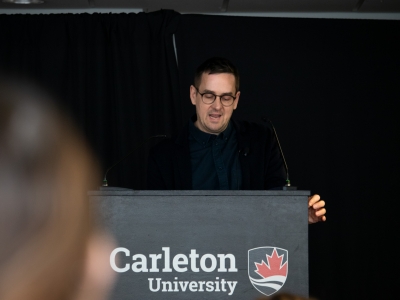Processes like seafood sustainability labelling programs or efforts to improve working conditions in the transnational supply chains for apparel and electronics are being devised and driven by non-governmental actors.
Digital era tools are interwoven in these efforts. Block chain technologies, for example, are increasingly used for secure record-keeping of products and organizations that are being governed. This new distribution of governing authority creates diffuse and opaque policy processes that cutting-edge research data analytic techniques can help disentangle.
Faculty researchers in the School of Public Policy and Administration (SPPA) have been awarded $188,774 through the Canadian Foundation for Innovation (CFI)’s John R. Evans Leaders Fund (JELF) to establish Canada’s first high-powered computing lab focused on the study of “De-centred Governance in the Digital Age.”
The project is led by Amanda Clarke, Graeme Auld and Nathan Grasse. Funds will be used to create a lab on campus that will allow researchers to compile, join-up and analyze social media data and large publicly available datasets and digital sources.
Brenda O’Neill, Dean of the Faculty of Public Affairs (FPA), says, “FPA is proud to house a lab — the first of its kind in Canada — that addresses government policies to make a real difference in the lives of communities in Canada and around the world. It’s a terrific example of the innovative and cutting edge research occurring in the Faculty of Public Affairs.”
Distribution of Authority

Amanda Clarke
Clarke says, “We anticipate that the lab will provide a space for both Canadian and international researchers and students to conduct groundbreaking research into democratic governance as it operates in a time of complex and rapid societal change, and amidst growing concerns over the robustness, and fragility, of our democratic institutions and processes.”
Governing authority has been diffused across all levels of government and to other non-governmental actors including businesses, nonprofits and philanthropic foundations. These non-governmental actors are not just being asked to assist governments with the implementation of public policies — they are also actively creating, implementing and enforcing rules to govern their own behaviour and the behaviour of others.

Graeme Auld
Auld says, “This is an exciting opportunity for the School and FPA to become a hub for scholars wanting to understand digital governance at a time when governments are no longer the only source of governing authority. The lab will help us build a network of scholars at Carleton and beyond who are working on these issues and advancing our understanding of the functions and consequences of decentred governance.”
“The lab is particularly timely,” says Grasse. “The amount of available information relevant to the study of decentered digital governance has grown rapidly, creating opportunities to answer research questions, but also requiring additional technical resources to collect and process this data.”
Invisible Networks of Power

Nathan Grasse
The project aims to integrate social science and data science techniques to look at influence in policy process and how this shapes policy outcomes.
Clarke says, “With this investment from the CFI, our team will be able to draw on new analytic techniques and sources of data to uncover the otherwise invisible networks of power and influence that underpin digital-age, decentred governance. Understanding how these networks operate will provide crucial insight into governing processes and societal power structures.
“For example, we know that tech firms regularly target government actors to promote their services, and in turn, to tighten their grip on public data systems and government services, Clarke says. “Our lab will provide the computing power, tools and expertise necessary to uncover this brand of under-the-radar, but pervasive, lobbying, illuminating the powerful and largely unaccountable influence that technology firms are exerting on our governments.”
With the new technical infrastructure, researchers will be able to examine attempts to influence policy, connections between organizations that influence decision-making, the effects of technology on policy implementation and the potential implications of public participation on policy evaluation and governance.
The three researchers have different research backgrounds, but they have brought their expertise together to create a stronger policy research project and to create the lab.
Clarke’s research examines the impact and role of digital technologies on public sector reform, policymaking and government-citizen relations. Auld’s work has been at the forefront of documenting the rise of decentred governance over the last three decades with a particular focus on global environmental challenges such as biodiversity conservation, natural resource management and climate change. Grasse looks at public-serving organizations’ governance and financial management, including the implications of strategic choices on financial health.
Wednesday, August 18, 2021 in News, Research, School of Public Policy and Administration
Share: Twitter, Facebook



